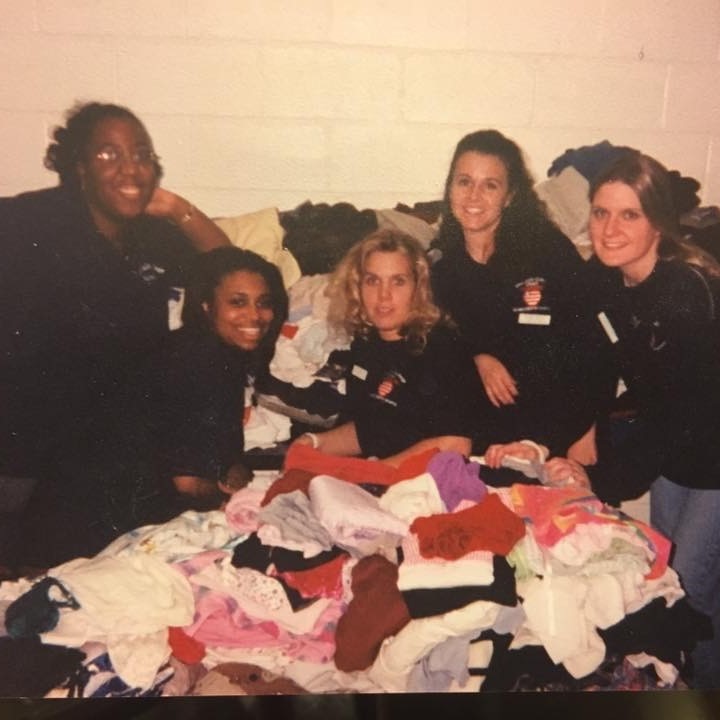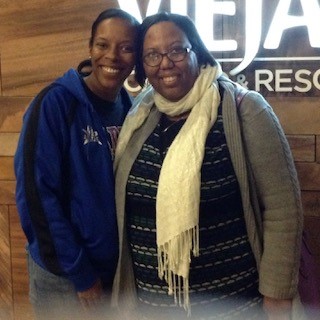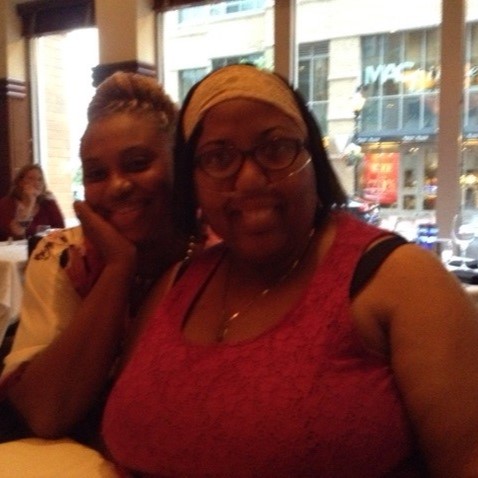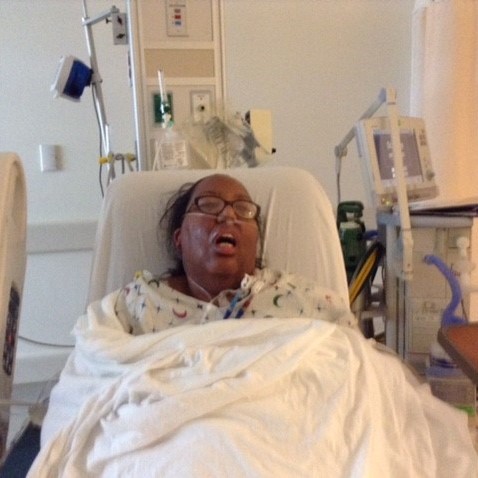
I was diagnosed with myasthenia gravis as a teenager. I remember it like it was yesterday…
I was 15 and attending summer band camp, learning color guard (flags). One morning, after washing my hair the night before, I developed double vision and my right eye was uncontrollable. One of the moms suggested an eye patch. Because we had to “wear” our flags all day, I wrapped mine around my head, earning me the nickname “Walking Wounded.” Everyone was really scared, but it never occurred to me that it wasn’t an isolated incident. I just laughed it off (my normal default) and kept moving forward.
Little did I know the bell had been rung and MG awakened inside me. What caused the bell to ring? The stress of my mom passing away three years before? My grandma passing away and the shock of finding her? My Dad remarrying and the horrible daily trauma inflicted by my stepmother (whom I called StepMonster) and her three kids? No one will ever know. But through it all, I did what I always did – I kept moving forward.
When I got home from camp, my health steadily declined.
I started losing weight because I was too exhausted to eat. I worked fewer hours at my job because the two mile bike ride before and after my shift was too much. My speech started slurring. I was dropping everything.
I fell one day at a football game, and everyone was screaming at me to stand up, but I physically couldn’t – a parent carried me off the field as the band continued the halftime show.
Finally, my dad took me to my pediatrician, who referred me to a local neurologist. He thought MG was a possibility, but looked at me quizzically and said, “Oh, I doubt it, though, because you’re Black and a girl, and it (MG) only happens to older, white men. But take this pill when you feel tired and see if it works.” It was Mestinon, of course. Because of the exorbitant cost, I only got 30 pills, which I took when I was tired – at night. Not only did it not work for me – it made me feel sick. I stopped eating because of excruciating stomach pain and exhaustion.
Everything started to deteriorate from there. I lost the ability to play my violin and went from 2nd chair first violin to last chair 3rd violin (aka “you showed up, so we gave you a spot”). I’d have to put my elbows on the windowsill in my shower to wash my upper body. I would get dressed at night and sleep in my clothes because in the morning I was too weak to fasten my jeans or clasp my bra. I tripped getting onto the bus in the morning because the step was so high (much to the amusement of my bus driver). I couldn’t hold my head up, see straight, take stairs, speak properly. Friends since elementary school speculated that I was experimenting with drugs, but knowing I shared EVERYTHING with them, they were just steadfast and supportive and never brought the obvious weight loss and changes to my attention.

The morning of my first real crisis, I was assigned to give a speech in speech class. I couldn’t hold my head up, was drooling, couldn’t articulate, which caused my teacher to berate me in front of everyone.
I went to my locker and suddenly I couldn’t breathe. One of my closest friends, Rita, asked me what was wrong. I couldn’t get any words out and kept mouthing, “I can’t breathe.” She quickly got me to the office, and the school called an ambulance to take me to our local hospital.
I still remember watching the building getting smaller and smaller as the EMT inserted an IV in my hand. At the hospital, they did a Tensilon test, while awaiting my dad to show up. Because no one really knew how to handle “possible MG,” they instructed my dad to drive me to Johns Hopkins Children’s Center2, where there were pediatric neuromuscular experts.
I remember meeting Dr. Daniel Drachman (a pioneering neuromuscular specialist whose research provided critical early insights into how MG works) in the lobby’s Children’s Zoo. I was terrified of him – he towered over me and had a deep, booming voice. He told me do knee bends, despite the fact I could barely stand, let alone bend down and get up!
He was talking to my dad and suddenly yelled, “She needs to be admitted or she’s going to die! She’s in an MG crisis!”
As I knelt on the floor, devising a plan to stand, I started looking around to see who they were talking about. I CERTAINLY wasn’t going to die, so there had to be someone else in the zoo besides stuffed animals they were talking about…
I was admitted for three weeks. They put me on 180 mg of prednisone daily, increased my Mestinon, and gave me peripheral plasmapheresis twice a week. My sister would come with me for the treatments, crying harder than I was every time they inserted the needles.

I was okay for about a month, living with my friend Hope because of my home situation. Her mom was a nurse and I was doing okay until right after Homecoming. Suddenly, the week before Halloween, I got pneumonia and was taken back to Hopkins Children’s Center. I was too sick for a private room and needed to be observed – in the room with all the babies.
This crisis was far worse than the last one. I was going downhill at 90mph. My medical team wanted to do a blood gas test, which I politely declined. I knew it would be horrifically painful, and my dad and aunt had visited the day before to check on me. The medical team told me I could have a Snickers bar if I allowed the draw. I had lost weight to around 110 pounds by then and knew I could eat candy since it didn’t really require chewing.
Either the painful blood draw or the sugar sent me into some kind of shock. I remember them bagging me as they rushed me to the Adult NCCU, the pictures of past years Neurology Resident classes watching me in black and white silence as the team hustled me to a room to intubate me. I recall the cracking sound as they broke the right side of my nose on nasal intubation.
I woke up tied down, lines and tubes in everywhere, unable to speak, and for the first time, afraid.
I hated the ventilator and quickly figured out that if I worked harder than it did, it would alarm, and they would turn it down. My nurse, Marti, immediately reassured me, “It’s okay, Pumpkin – we’re going to take care of you.”
I ended up having an open sternal thymectomy. Unfortunately, I suffered a serious bone infection, leading to a large part of my sternum being removed. I learned how to do my own sterile wet to dry dressing changes as soon as they would let me. At least I could control the amount of pain I had to endure.
Because of the severity of the wound, I had the first-ever packed sternal flap surgery done on a child at Hopkins, with a team of plastic and orthopedic surgeons. I
remember them coming into my room for morning rounds, flipping the lights on, and seeing 20 strangers around my bed. I thought, “All these people have seen me naked, and I’ve only kissed two boys in my life!” I was a kid in the adult unit, and no one considered the needs of the teenage girl. I hated being in my room and took an interest in what the nurses were doing and wanted to help. After my tutors had left and my homework was done, I helped the nurses around the unit with admin chores like stamping patient labels and filing charts (this was pre-HIPPA!).
I was discharged to my Dad and StepMonster soon after my 16th birthday party in the hospital. Determined to graduate on time, I attended both night school and summer school. It never even crossed my mind that I wouldn’t finish high school alongside my friends. I got accepted into Drexel University, Virginia Tech, North Carolinda A&T, and a full scholarship to Coppin State College (now University).
I became Student Senate President, graduated with honors, and started working in medical research and as a phlebotomist. One of the doctors I worked with wrote me a letter recommending me for nursing school. Two years later, I earned a BSN. During this time, I was married, divorced, and managed the MG roller coaster that never seemed to stop.
Surprisingly, life came full circle – I ended up back at Johns Hopkins as an operating room nurse in Neurosurgery and Orthospine Surgery. Many “new” colleagues (Attending Physicians who were once my Resident Physicians) kept asking me, “Don’t I know you?!”
Finally, Dr. Laurel Moore recognized me. She hugged me tight and said, “We always wondered what happened to you! We knew you’d be a nurse!” It was always nice to go to the NCCU and say hello to my now colleagues who were there for me when no one else was.
One day, during surgery, a neurosurgeon commented to me, “I remember you! You know you’re old when your patients become your colleagues.” Even while wearing a mask, I could tell he was smiling.
I found my way back to medical research because I’ve always been “that patient.” I always researched my new medications. I needed to know everything all my options and if how I was feeling was a side effect.
No medications or treatments worked for me for so many years. I had accepted this was just MG, until I went to University of Maryland and met Dr. Charlene Hafer-Macko. As I was working there on a research project, I remember being exhausted, laying my head on my folded arms as she did my intake. She asked me, “When’s the last time you felt normal?”
I was in shock. Wasn’t how I felt “normal”? Was it possible that I could feel any better? She immediately put me on a course of plasmapheresis followed by IVIG infusions. I did okay for three years, before I had to put my career on hold as MG progressed, my weight soared, I was diabetic, oxygen dependent, and had no quality of life.

On my 40th birthday, I threw a clot and was emergently intubated. I have no idea what occurred in the three days prior to the crisis, nor during my intubation, as now patients are kept asleep while on the ventilator. My doctors decided to change my treatment to Rituxan (rituximab, a monoclonal antibody treatment that often works well for MuSK-positive patients like me). It was the only treatment that’s ever worked for me, where I feel “normal.”
I was able to resume my nursing career in 2022 and had my last infusion in October 2023, with checkups every three months and no infusions planned.
Medical research has taught me that I’m both inquisitive and an advocate. I enjoy working with patients who feel like the medical system has historically been working against them. It’s my goal to help them understand that everyone is not out injure patients or make a name for themselves. The ultimate goal is to help make the world a better place than we found it. It’s okay to donate an organ or participate in a clinical trial. And without people being brave enough to try, there is truly no hope for helping others who seek help on their own journey down our path.
Because I was never discouraged by my mom or told what I couldn’t do or be, it never occurred to me that I wouldn’t survive the first time the MG bell rang. I’ve learned to live my life in appreciation of those who helped me and those who did not survive. I do things that make me feel better – like exercising, staying hydrated, keeping my mind active, and protecting myself with masks and yearly vaccinations. I learned that nutrition matters, stopping the cycle of “Feeling tired –> drinking a soda/eating candy –> falling asleep –> feeling tired –> repeat.” I figured out which foods flare my myasthenia and what makes me feel better. I decided that I was important. I’ve lost a lot of weight and am no longer an insulin-dependent diabetic or requiring constant oxygen. It’s definitely taking me time to get used to the changes, but this is a good change.
I always say, “I don’t get frustrated – I get determined.” MG is sneaky and allows you fall into the trap of depression and hopelessness. Having a rare disease is not a ticket to wallow – it’s the opportunity to overcome. I was told I would never live a month, graduate high school, graduate college, walk without braces or use a wheelchair, drive a car, travel. I try to find a way around the limitations I know in order to live my best life. While there are some limitations MG and you don’t want to hurt yourself, YOU are your own best advocate and voice of how you feel.
I just celebrated my 50th time around the sun a few days before this published. This year I want to really celebrate life in honor of Ronnie and Pam who didn’t get to tell their MG stories. I’m planning “50 things to do while I’m 50” in honor of the birthday I barely survived a decade ago. Sharing my MG story here for the first one I get to cross off. Thank you for reading and being part of my journey.

